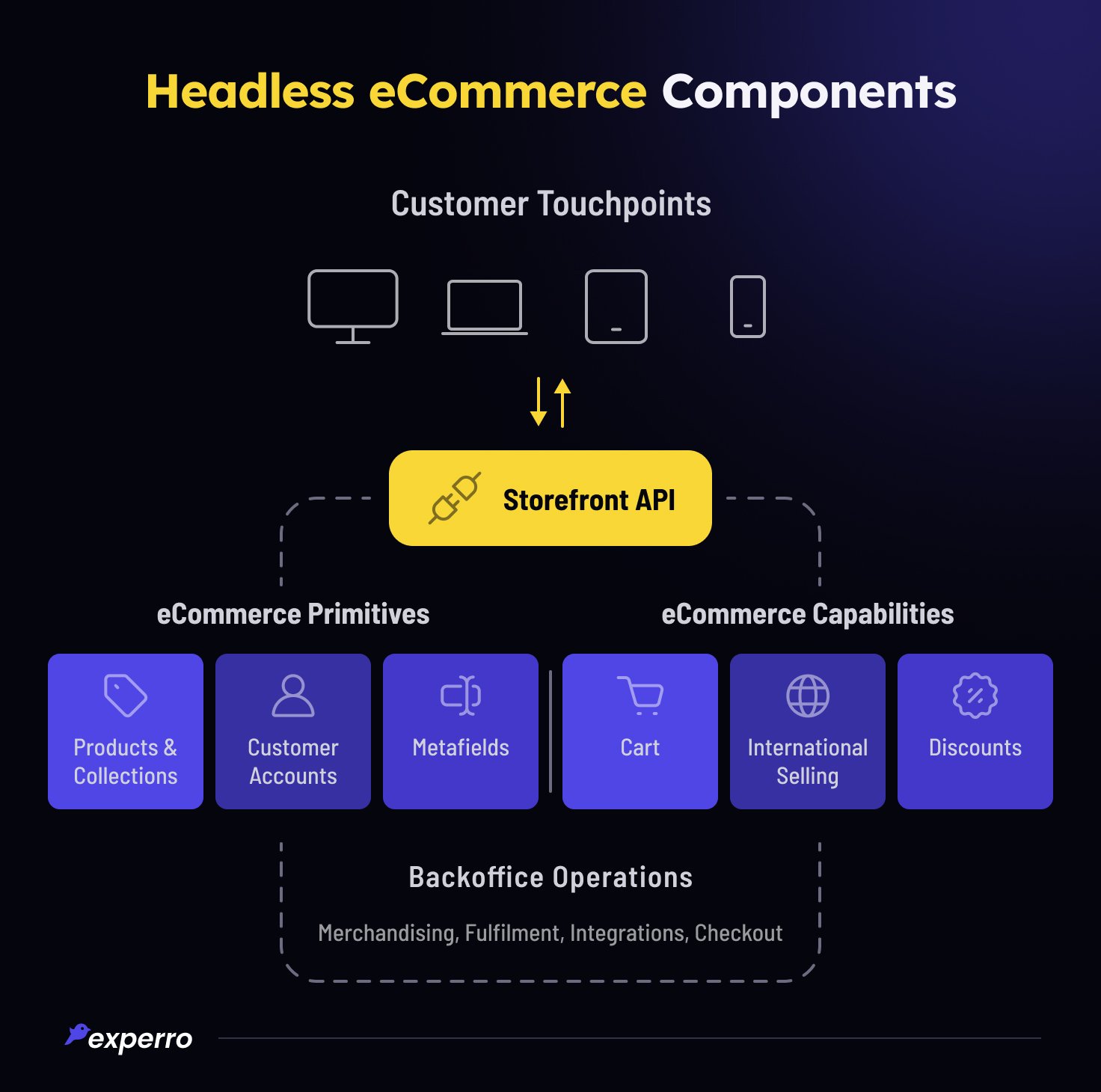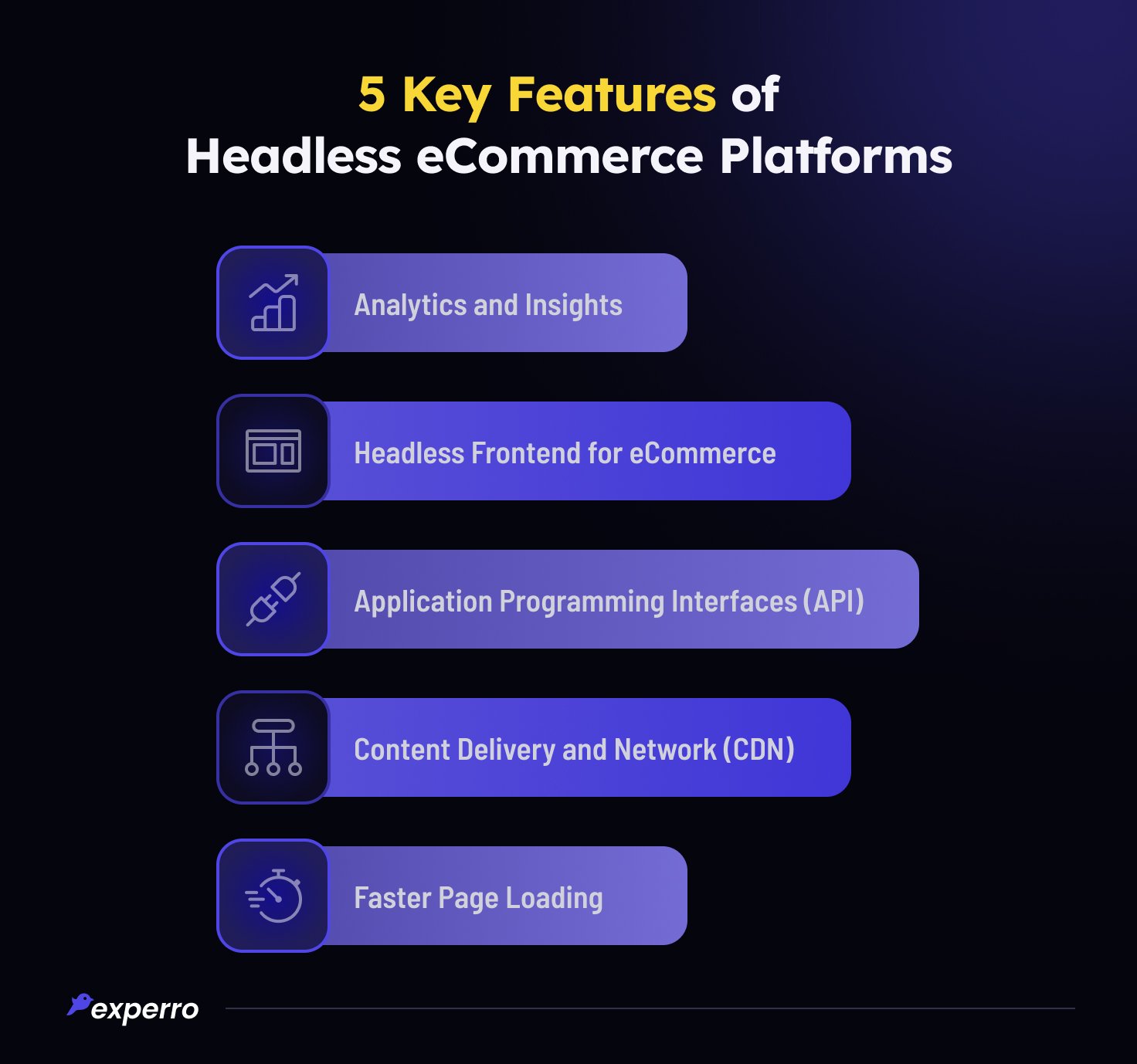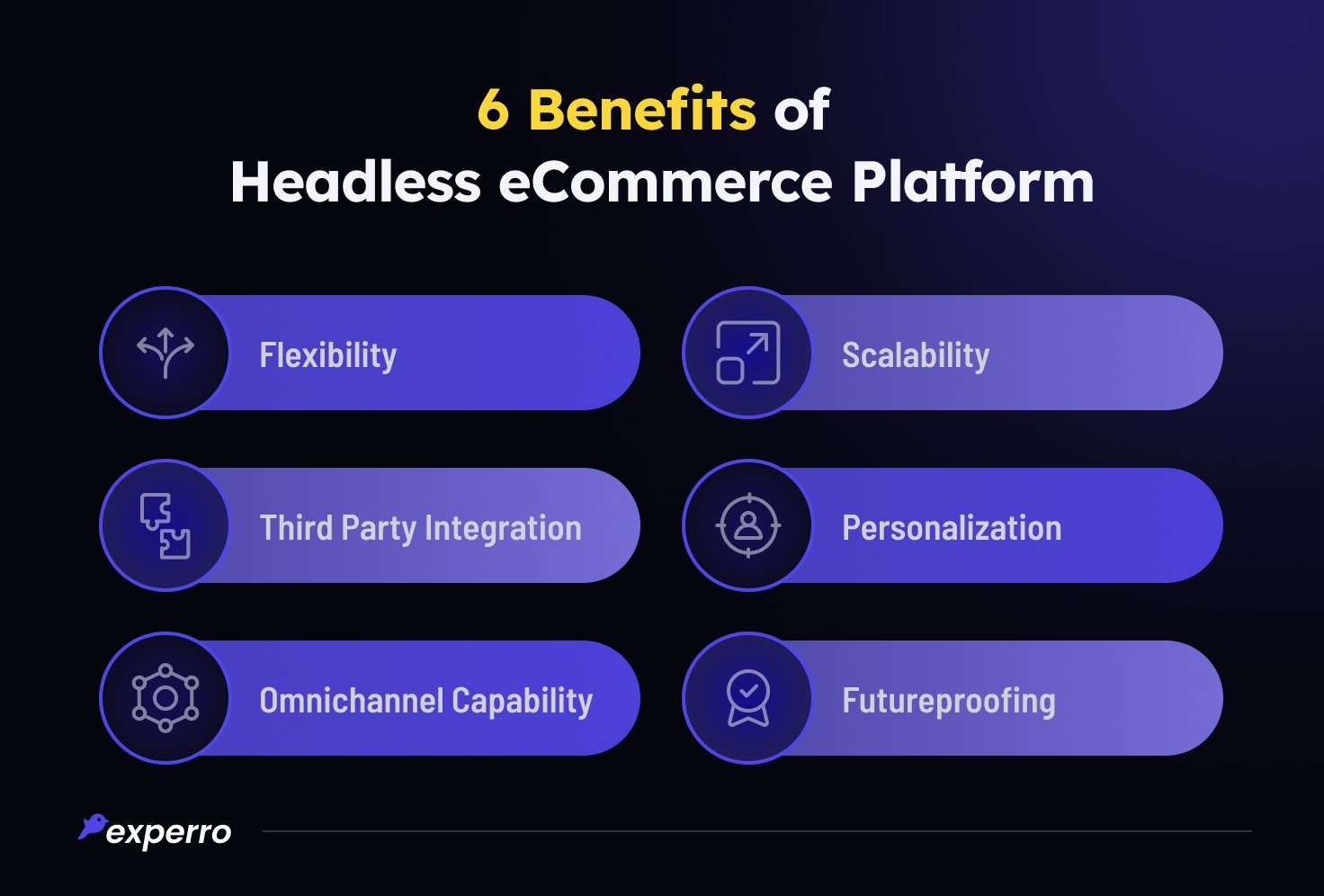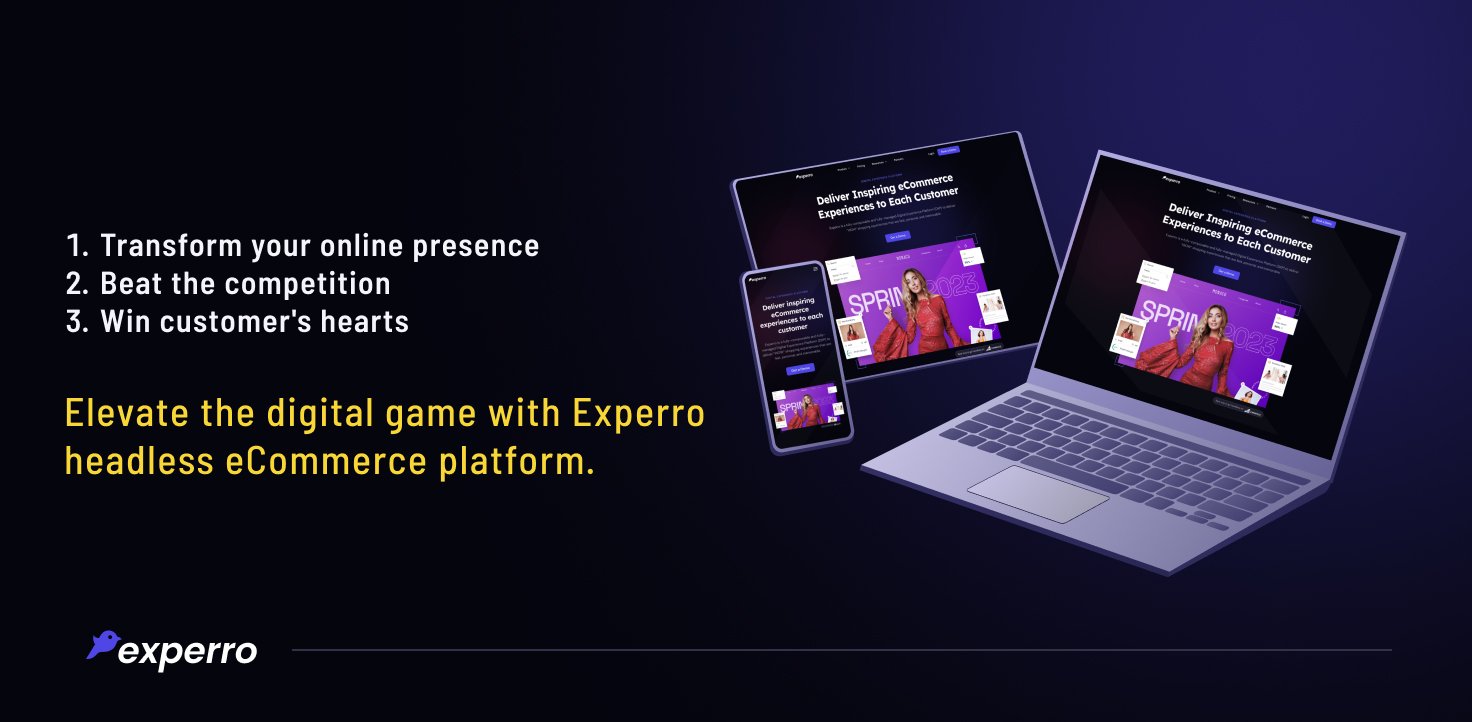10 Best Headless eCommerce Platforms in 2024

What’s Inside
- What Is a Headless eCommerce Platform?
- 10 Best Headless eCommerce Platforms to Elevate Your Business
- 5 Key Features of Headless eCommerce Platforms
- 6 Benefits of Headless eCommerce Platforms That Can Transform Your Digital Journey
- Concluding Thoughts
Key Takeaways
- The eCommerce industry has witnessed an unprecedented rise over the past years, with over 2.4 billion shoppers buying online.
- eCommerce constantly breaks through with new changes and technologies. Using a top headless eCommerce platform today is the need of the hour.
- Only the best headless eCommerce platforms are both developer and user-friendly.
- The headless approach has emerged as a solution to the limitation of traditional eCommerce platforms.
As shopping online is the new normal, delivering an exceptional customer experience is imperative for businesses. You must give your customer a reason to stop at 'your online store' among millions of options.
But here is the catch: providing the unparallel eCommerce customer experience isn't limited to just an appealing website, or easy navigation. Instead, it encompasses every aspect, from seamless interaction on every digital touchpoint to personalization and beyond.
Rest assured all your eCommerce needs can be achieved with a single headless eCommerce platform. However, the question remains: which one stands out as the absolute best choice?
That is why in this article, we will provide you with a curated list of the best headless eCommerce platforms, their prices, free availability, and pros and cons.
What Is a Headless eCommerce Platform?

Did you know? 92% of businesses think delivering a powerful digital experience with headless commerce platforms is easier.
Headless eCommerce platforms have a separate architecture of CMS that generates greater flexibility, consistency, and agility. Unlike a traditional eCommerce platform, its frontend (presentation layer) is separated from the backend (content library).
We can say that, as the head (content presentation) is removed from the back (content creation), developers can put the head of their choice – meaning they can deliver personalized content according to the needs of different users.
10 Best Headless eCommerce Platforms to Elevate Your Business
Find out crucial details like the price, free trial availability, and pros and cons of each headless eCommerce platform on your list.
1. Experro

Experro is the one-stop solution for eCommerce websites that want to upscale and deliver incredible digital experiences for customers. Several well-known merchants around the world have used Experro and achieved the desired results. With a headless approach, Experro is both a developer and marketer-friendly platform.
It caters to all eCommerce business models B2B, B2C, or D2C. Experro's personalization capabilities make it easy to deliver the right product to the right customer at the right time!
The exclusive features, AI-powered search, and eCommerce merchandising aim to provide a smooth and memorable digital experience to users.
Moreover, being on the top headless commerce platforms, it builds magnificent storefronts for blazing-fast eCommerce. Ultimately, Experro provides the best headless frontend for eCommerce and a rich user experience that does not fail to drive engagement and conversion.
Price – Available upon request.
Free Trial – FREE demo available.
Pros of Experro | Cons of Experro |
|---|---|
| Caters to all business models B2B, B2C & D2C | Requires a decent amount of time and effort to learn about features |
| 24/7 customer support availability | Requires little technical knowledge to get started |
| Builds exceptional shopping experience with personalization | |
| Built in SEO tools | |
| Enables tailored customer experience that drives conversion | |
| Pre-built library of designs for storefront | |
| Delivers consistent and cohesive experience across all channels | |
| Work in two different environments - staging and publishing. Test in staging and direct upload in publishing environment. |
2. Magento (Adobe Commerce)

Magento, now known as Adobe Commerce, is a headless eCommerce open-source platform catering to B2B and B2C businesses with cloud-based functionality. It offers service to brands of all sizes and industries.
Adobe Commerce is widely focused on user experience with centralized data, advanced search, and merchandising capabilities. It provides advanced personalized experience to customers by deriving valuable insights.
Price – $1988.00 per month.
Free trial – Not available.
Pros of Magento | Cons of Magento |
|---|---|
| Provides a wide range of products that aligns to achieve a desired goal of business | Numerous sets of tools can be confusing to understand |
| Real-time profile analysis of customers for personalization | Not compatible with small businesses and startups |
| Follows customer journey to fetch valuable insights | High learning curve due to complex features |
| Requires technical expertise for customized content delivery |
3. Salesforce Commerce Cloud

Salesforce commerce cloud is another cloud-based headless eCommerce platform. It creates a unified purchase experience across all channels such as mobile apps, social media, websites, and more.
Salesforce allows easy website development with pre-built storefront architecture. Its artificial intelligence-added power tools track customer behaviors and fetch valuable insights for conversion and engagement. Moreover, it runs A/B testing for marketing campaigns to generate tailored customer experiences.
Price – It has different prices for various business models. Price would be available upon request.
Free trial – Not available.
Pros of Salesforce Commerce Cloud | Cons of Salesforce Commerce Cloud |
|---|---|
| Able to manage high level of traffic and transactions | Expensive |
| Provides seamless shopping experience across various channels | Slow responsiveness |
| Easy integration with third-party tools | Less user-friendly backend interface |
| Provides security and protects customer data | Complex and time-consuming setup |
| Poor customer support |
4. Contentful

Contentful is also one of the popular headless content management platforms founded in 2013. It is designed with an API-first approach, enabling content delivery on various digital platforms. Many users use it for eCommerce platforms.
Its intuitive user interface provides a great experience for its customers. Contentful usage needs less support from IT so that it can be accessed seamlessly. It's 25-day window recovery store and secures all the data of the website.
Price – $489 per month.
Free trial – Available.
Pros of Contentful | Cons of Contentful |
|---|---|
| Highly scalable and easy to use | Features are quite complex and difficult to understand |
| Flexible creation of content templates | Time-consuming to create new pages |
| Faster delivery of content and secure data | Limited content types to use |
| Expensive | |
| Support team is reachable only via tickets on vendor's website |
5. Commercetools

Commercetools is another cloud-based API-first headless eCommerce platform. Its modular architecture makes it ideal for businesses involved in eCommerce and aims to provide a seamless and personalized customer experience.
Moreover, Commercetools supports B2B, B2C, and D2C business models. Its composable commerce enables the creation of multiple strategies for the growth of various brands.
Also, every step of the customer journey is tailored to provide a highly personalized customer experience. Creates seamless content distribution with omnichannel capabilities.
Price – Available upon request.
Free trial – Available.
Pros of Commercetools | Cons of Commercetools |
|---|---|
| Faster time to market for new products and features | Data mapping limitation |
| Provides real-time inventory management | High degree of customization is limited due to the complex structure of platform |
| Multichannel support and mobility | Lacks enterprise-level features |
| With fully API approach there is no need to use SQL or other customization | Small development community |
| Lack of consistent support |
6. Shopify Plus

Shopify Plus is a widely popular headless eCommerce platform. It provides headless commerce services to businesses in need of managing their online store. The headless eCommerce Shopify Plus is designed to enable a highly scalable service that can manage increased traffic and global content consumption.
It provides 24/7 customer service that enhances customer satisfaction. Headless eCommerce Shopify focused on providing hyper-growth to businesses and generating tailored customer experience.
Price – $2000 per month.
Free trial – Available.
Pros of Shopify Plus | Cons of Shopify Plus |
|---|---|
| High scalability | Data migrating limitations due to its platform structure |
| Easy to manage product inventory | Expensive as compared to competitors |
| Incredible customer support with 24/7 availability | More complex learning curve |
| Popular among third-party services as integrating partner | Expensive paid theme options |
| Less user-friendly blogging interface | |
| Lack of control over SEO during migration |
7. Elastic Path

Elastic Path is also one of the popular API-based headless eCommerce solutions. Elastic Path has implemented a centralized approach for managing complex digital experiences across various geographies, business models, and brands.
It offers payment integration without complex checkouts in 25+ languages and 135+ currencies. Moreover, it provides product data and catalog management that rapidly composes and optimizes websites. Offers multiple business models.
Price – Available upon request.
Free trial – Available.
Pros of Elastic Path | Cons of Elastic Path |
|---|---|
| Users can modify store settings without the need for IT support | Less accessible for smaller business |
| Seamless integration with multiple digital channels | Limited documentation for beginners |
| Provides enterprise-level security and compliance | Lacks catalog versioning feature |
| Secured customer data and high scalability | Doesn't have Multilanguage support for handling request and response data |
| Not effective in storing data |
8. OroCommerce

OroCommerce is a headless eCommerce platform popular among B2B businesses, wholesalers, and manufacturers. This product has worked with quite well-known brands around the globe. It has built-in CRM software to integrate and boost customer engagement.
Their B2B open-source software enables greater scalability and flexibility. Their rest API enables third-party system integration and real-time customer engagement analysis. It holds the capability to transfer a large amount of data to clients as and when required without facing downtime.
Price – Available upon request.
Free trial – Available.
Pros of OroCommerce | Cons of OroCommerce |
|---|---|
| Offers powerful CRM tool to engage the customer | High learning curve |
| Provides extensibility for future growth | Not compatible with small businesses |
| Is a great platform for B2B business owners | Limited customization |
| Highly flexible and scalable platform | Limited extension service |
| Poor development support and availability |
9. Swell

Swell is a US-based top headless commerce software that offers omnichannel capabilities and extensive customization. It processes payments through multiple gateways with API-based functionality. Being one of the headless commerce companies, it offers unified experience with both B2B and B2C.
It has built-in custom storefronts, which are easy to customize according to the need of the user. It also provides seamless integration where you can manage customer data, products, and inventory all at once.
Price – Available upon request.
Free trial – Not available.
Pros of Swell | Cons of Swell |
|---|---|
| Easy localization for a global audience | Limited integration with third-party applications |
| Unlimited product catalog | Beginner in the eCommerce industry |
| Secured payment gateway | Smaller community |
| Lack of direct customer support | |
| Limited pre-built storefront |
10. Strapi Enterprise

Last but not the least, Strapi enterprise is also one of the leading headless eCommerce platforms. Based on 100% JavaScript and highly customizable.
Moreover, Srapi Enterprise offers multi-database support with SQLite, MySQL, and Postgres. Integration with popular software for plugging and enhanced customer experience. The creation of storefront design is flexible and developer-friendly.
Price – Available upon request.
Free trial – Available.
Pros of Strapi Enterprise | Cons of Strapi Enterprise |
|---|---|
| Easy to understand documents | Limited data migration |
| Fully customizable backend | Frequent updates are quite annoying |
| Enables translated content for a global audience | Complex migration process |
| Authorization of data for customization | Need upgradation to premium version for custom plugin support |
| TypeScript support is limited |
5 Key Features of Headless eCommerce Platforms

Headless eCommerce systems are compatible with the modern digital landscape and meet specific customer needs, such as personalization, faster delivery, and cross-functional and multichannel accessibility of content.
Here is the list of five key features of headless commerce system:
1. Analytics and Insights
As an eCommerce business owner, knowing who your customers are and what they want becomes important to fulfill personalized customer needs.
Headless eCommerce platforms integrate with customer analytics tools, track customer behavior, and provide valuable insights that enable delivering relevant content to the audience.
2. Headless Storefronts for eCommerce
Headless store frontend refers to the digital storefront – the part displayed to the end users. It indeed allows eCommerce brands to deliver personalized content on different channels seamlessly.
The decoupled approach of eCommerce headless provides developers the freedom to manage and deliver content in a flexible manner to the user with eliminated need of coding.
3. Application Programming Interface (API)
Headless eCommerce platforms use API first to deliver content, which enables agile and flexible content delivery. Here, content is first stored in a database system, and then the requested content is delivered through the APIs on different platforms such as websites, social media, and mobile apps.
The headless eCommerce API delivers content seamlessly on all digital channels and provides greater flexibility to developers to deliver content.
3. Content Delivery Network
Delivering content at the right time is way more important than merely delivering content.
The eCommerce websites can enhance content delivery with CDN integration of headless CMS. It works as a distribution tool that delivers the latest content to the user ASAP!
Moreover, headless commerce solutions help to manage the website with high traffic volumes and a global audience. It also enables smooth accessibility to a wide variety of content across multiple channels.
5. Faster Page Loading
One out of four users will leave the website if it takes more than four seconds to load. Does that sound scary to you?
Slow page loadings can annoy users and result in a bounce rate. The headless solution for eCommerce enables faster page loading and ensures that users get a memorable shopping experience.
6 Benefits of Headless eCommerce Platforms That Can Transform Your Digital Journey

Websites built with traditional commerce architecture often fall short of fulfilling the requirements of the modern digital landscape whereas, headless eCommerce solutions are proven to be agile, flexible and seamless.
So, let's explore the benefits of headless commerce.
1. Enables Greater Flexibility
The greater flexibility provided by the decoupled architecture of headless eCommerce platforms enables developers to deliver content seamlessly without custom integration. Unlike traditional commerce storefronts can be customized according to the need of the user without investing much time.
Due to flexibility the right content is delivered at the right time based on the customer's choice and preference.
2. Enhanced Scalability
Scalability is crucial to building the long-term value of your website. A Headless Commerce solution can handle increased traffic and global volume. With a scalable eCommerce website, a large volume of product catalogs can also be stored. This way, your users will not face downtime or page-loading issues on the days of festivals or flash sales.
3. Effortless Integration with Third-Party Tools
Headless eCommerce solutions can easily integrate with third-party tools to manage easy workflow and increase teamwork and collaboration. Third-party tools such as SEO and CRM tools can help drive more traffic and engagement.
4. Personalized Customer Experience
Personalization is the new battlefield in the world of eCommerce. Headless eCommerce platforms enable composable commerce by following the customer journey thoroughly to deliver personalized content and increase customer satisfaction.
With personalization approach 89% of marketers have seen a positive ROI. Headless commerce architecture enables delivering personalized e-mails and product recommendations based on the location and interest of the user.
5. Omnichannel Capability
A total of 60% of millennials want a consistent user experience over multiple touchpoints.
Earlier content consumption was limited to only a single channel. However, over the past few years, it rapidly shifted to multiple digital channels such as websites, mobile applications, and social media platforms.
Headless eCommerce platforms can deliver content seamlessly on these multiple channels without creating content repeatedly. Reducing repeated content creation saves time and efforts of developers and they can focus on more important tasks.
6. Future-Proofing the Business
Headless eCommerce solution is compatible with changing business needs and integrates with the latest technologies to enhance the customer experience. It also secures the transactions and customer data to enhance security.
Concluding Thoughts

Headless eCommerce platforms can be highly effective in generating tailored customer experiences. You just need to choose the right platform for your business; the rest will be handled by itself.
Moreover, headless eCommerce solution offers a high level of flexibility and customization, allowing businesses to increase engagement and conversion, leading to increased business value. If you are ready to explore how headless eCommerce platforms can transform your digital business, book a demo with Experro now!
FAQs


Priya Zala
19 July 2024Through her writing, she has a lovely way of capturing users' pain points and delivering solution-oriented content. Her writing is sure to captivate readers and leave them with a lasting impression. When not crafting content, Priya enjoys getting lost in a good work of fiction, which soothes her soul.